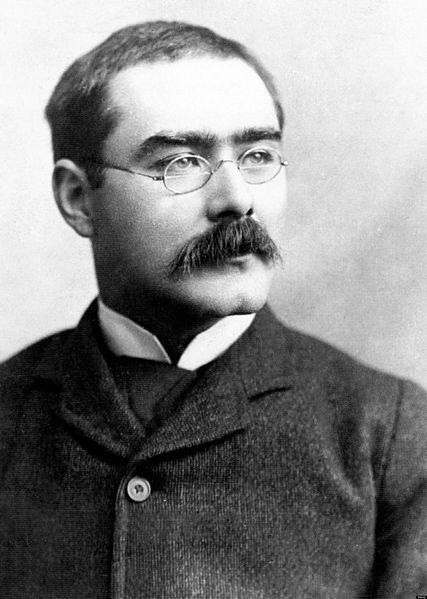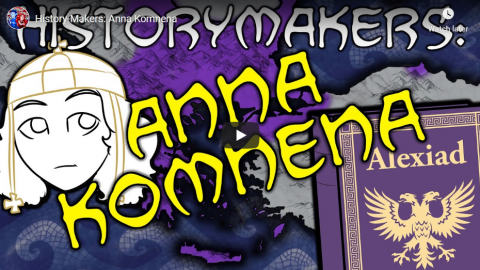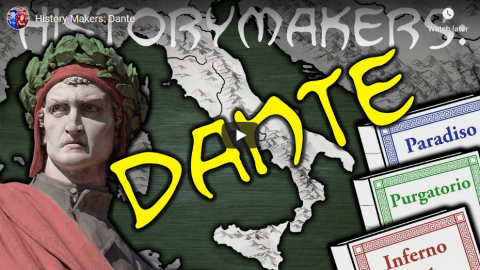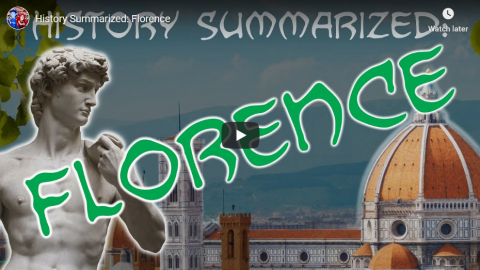Overly Sarcastic Productions
Published 28 Feb 2020She’s a Princess! She’s a Poet! She’s a Historian! She’s Anna Komnena — the COOLEST writer in the Byzantine Empire! On this episode of History-Makers, jump into the reign of Alexios Komnenos from the perspective of his daughter Anna, and learn about the emperor who saved the Byzantines from certain doom, as well as the traits that make Anna’s Alexiad a masterpiece.
This video was edited by Sophia Ricciardi, AKA “Indigo”.
Our content is intended for teenage audiences and up.Sources & Further Reading: The Alexiad — obviously, what are you waiting for? (Also Norwich’s Byzantium)
PATREON: https://www.Patreon.com/OSP
DISCORD: https://discord.gg/h3AqJPe
MERCH LINKS: https://www.redbubble.com/people/OSPY…
OUR WEBSITE: https://www.OverlySarcasticProductions.com
Find us on Twitter https://www.Twitter.com/OSPYouTube
Find us on Reddit https://www.Reddit.com/r/OSP/
March 2, 2020
History-Makers: Anna Komnena
December 31, 2019
“If” by Rudyard Kipling

Portrait of Rudyard Kipling from the biography Rudyard Kipling by John Palmer, 1895.
Photo via Wikimedia Commons.
If you can keep your head when all about you
Are losing theirs and blaming it on you,
If you can trust yourself when all men doubt you,
But make allowance for their doubting too;
If you can wait and not be tired by waiting,
Or being lied about, don’t deal in lies,
Or being hated, don’t give way to hating,
And yet don’t look too good, nor talk too wise:If you can dream — and not make dreams your master;
If you can think — and not make thoughts your aim;
If you can meet with Triumph and Disaster
And treat those two impostors just the same;
If you can bear to hear the truth you’ve spoken
Twisted by knaves to make a trap for fools,
Or watch the things you gave your life to, broken,
And stoop and build ’em up with worn-out tools:If you can make one heap of all your winnings
And risk it on one turn of pitch-and-toss,
And lose, and start again at your beginnings
And never breathe a word about your loss;
If you can force your heart and nerve and sinew
To serve your turn long after they are gone,
And so hold on when there is nothing in you
Except the Will which says to them: “Hold on!”If you can talk with crowds and keep your virtue,
Or walk with Kings — nor lose the common touch,
If neither foes nor loving friends can hurt you,
If all men count with you, but none too much;
If you can fill the unforgiving minute
With sixty seconds’ worth of distance run,
Yours is the Earth and everything that’s in it,
And — which is more — you’ll be a Man, my son.
(Written in 1895, but not published until 1910.)
H/T to Lawrence W. Reed.
December 22, 2019
History-Makers: Dante
Overly Sarcastic Productions
Published 20 Dec 2019From the visionary creator who brought you the Self-Insert Fanfic comes… the invention of Worldbuilding and the most revolutionary literature in history? Woah, that was unexpected.
Grab your nearest Virgil, because we’re about to dive into Dante’s complex afterlife and learn how a Florentine poet used an ancient genre of poetry to kickstart what would become the Renaissance.
Further Reading: I would highly recommend Allen Mandelbaum’s translation of the Divine Comedy (Bantam Classics makes it), specifically because it features an opposite-facing translation, so the English appears directly adjacent to the original Italian. Regardless of your familiarity with Italian, Dante’s use of language is beautiful to listen to. It’s also just a good translation in general. Please do yourself a favor and read through some Dante.
Our content is intended for teenage audiences and up.
DISCORD: https://discord.gg/sS5K4R3
PATREON: https://www.Patreon.com/OSP
MERCH LINKS: https://www.redbubble.com/people/OSPY…
OUR WEBSITE: https://www.OverlySarcasticProductions.com
Find us on Twitter https://www.Twitter.com/OSPYouTube
Find us on Reddit https://www.Reddit.com/r/OSP/
December 8, 2019
History Summarized: Florence
Overly Sarcastic Productions
Published 6 Dec 2019Get 3 months of Audible for just $6.95 a month. That’s more than half off the regular price. Visit http://www.audible.com/overlysarcastic or text
overlysarcasticto 500 500.Can’t start a Renaissance without building a few *Domes* — You’ve seen the memes, now learn the history behind the magnificent city of Florence!
It may sound like sacrilege, but many years ago, Florence was the first Italian city that little Blue had a cartoonishly-overblown obsession for — move over, Venice. In fact, Florentine history is basically THE reason I ever started caring about History in the first place. So I hope that you find this exquisite chapter in world history as enjoyable as I do.
SOURCES & Further Reading:
Death in Florence — Paul Strathern https://www.audible.com/pd/Death-in-F…
Florence: The Biography of A City — Christopher Hibbert
Be Like The Fox: Machiavelli In His World — Erica BennerOur content is intended for teenage audiences and up.
DISCORD: https://discord.gg/sS5K4R3
PATREON: https://www.Patreon.com/OSP
MERCH LINKS: https://www.redbubble.com/people/OSPY…
OUR WEBSITE: https://www.OverlySarcasticProductions.com
Find us on Twitter https://www.Twitter.com/OSPYouTube
Find us on Reddit https://www.Reddit.com/r/OSP/
November 5, 2019
QotD: Die Lösung (The Solution)
Nach dem Aufstand des 17. Juni
Ließ der Sekretär des Schriftstellerverbands
In der Stalinallee Flugblätter verteilen
Auf denen zu lesen war, daß das Volk
Das Vertrauen der Regierung verscherzt habe
Und es nur durch verdoppelte Arbeit
zurückerobern könne. Wäre es da
Nicht doch einfacher, die Regierung
Löste das Volk auf und
Wählte ein anderes?After the uprising of June 17th
The Secretary of the Authors’ Union
Had leaflets distributed in the Stalinallee
Which said that the people
Had forfeited the government’s confidence
And could only win it back
By redoubled labour. Wouldn’t it
Be simpler in that case if the government
Dissolved the people and
Elected another?Bertolt Brecht, 1953.
October 30, 2019
Homer, the Trojan War & the Late Bronze Age Collapse
History Time
Published 20 Mar 2018This is the first in a new series I will be producing on the Late Bronze Age Collapse.
If you enjoyed this video and would like to see more then please consider supporting me on Patreon:-
https://www.patreon.com/historytimeUK (every dollar helps)Are you a budding artist, illustrator, cartographer, or music producer? Send me a message at petekellywriter@gmail.com No matter how professional you are or even if you’re just starting out, I can always use new music and images in my videos. Get in touch! I’d love to hear from you.
I’ve compiled a reading list of my favourite history books via the Amazon influencer program. If you do choose to purchase any of these incredible sources of information then Amazon will send me a tiny fraction of the earnings (as long as you do it through the link) (this means more and better content in the future) I’ll keep adding to and updating the list as time goes on:-
https://www.amazon.com/shop/historytimeI try to use copyright free images at all times. However if I have used any of your artwork or maps then please don’t hesitate to contact me and I’ll be more than happy to give the appropriate credit.
September 15, 2019
QotD: “Whenever I hear the word ‘culture’ I reach for my Browning”
This, attributed to Goering but rather indited by some other nutjob mediocrity, is among my favourite phrases. Often I cite it with glee. I know just what he meant; rarely has one the chance to empathize with Nazis. Monsters they were, but also human, and if we lose the means to recall what made them tick, we are disadvantaged against their successors.
Ditto with Islamic terrorists, incidentally. Unless we can see them, sometimes, from the angle that makes them most attractive, we miss the whole picture. Know the enemy, I say. The worst psychopath may offer to share some droll humour. It is my firm belief that even liberals and progressives can be charming, sometimes.
I wonder which part of Mr Browning’s works Herr Goering would reach for? Would it be an earlier work, as Paracelsus or Sordello? A later, such as Jocoseria or Asolando? Me, I think I would start with a dilatory romp through the Dramatic Idylls, then hunker down with The Ring and the Book.
David Warren, “Include me in”, Essays in Idleness, 2017-08-30.
May 12, 2019
History-Makers: Homer
Overly Sarcastic Productions
Published on 10 May 2019Visit PhilosophicalPhridays.com to learn more about Blue’s BOOK!
“History-Makers” is a new series from Blue, digging into the backstories of history’s most influential writers and their great works. We begin at the beginning, with the Greek poet Homer, trying to figure out how exactly he wound up with the Iliad and Odyssey!
Let me know which History-Maker you’d like me to cover in the comments below!
PATREON: https://www.Patreon.com/OSP
April 3, 2019
A review of Woke by Titania McGrath
The poetic titan of Twitter, ultra-woke voice of her generation Titania McGrath (recently revealed to be the creation of comedian Andrew Doyle), is now a published author:
… Titania McGrath, the radical intersectional feminist poet who verbally bombards the “white supremacist patriarchy.” A malcontent who is fed up with us ignoramuses, McGrath has published her first book. Simply titled Woke: A Guide to Social Justice, it’s a manifesto written in prose possessing a revolutionary zeal so potent Che Guevara would lecherously swoon and request that she provide him with remedial education in social revolution.
McGrath addresses the vast intricacies of wokeness and responds to the counterarguments that the agents of the patriarchy often make. She also outlines how this puritanical movement can attract converts. Her insight is sought after since, after all, “our society is a slumbering beast that has been trapped in its coma for far too long.”
Proving to be Winston Churchill’s 21st-century equivalent, McGrath teabags “the foes of justice with a gender-neutral scrotum.” And challenges the “illusion of freedom” to extirpate Nazis and destroy any other obstacles to the “Intersectional Socialist Utopia.”
We all live in a “heteronormative patriarchy” that’s a “Tyranny of Facts” erected by the “Scourge of Whiteness.” Knowledge is a “patriarchal construct” that is only convenient for those who want to strengthen the white male authoritarians’ grip on power. So what must we do to rectify this?
According to McGrath, our society is almost irreparably “unwoke,” and we might have to implement drastic purgatory measures. We shall be heedful of the wisdom of brave reformists like Hannah Gadsby and eradicate anything offensive. Reforming things like comedy and any other art form perceived to be toxically masculine should be our first priority. Scientists will also tremble at the feet of these woke revolutionaries. As McGrath avers: “The idea that knowledge is more important than feelings is everything that is wrong with the field of modern science.”
With a knack for conflict analysis that would rival Churchill’s, McGrath identifies our real enemies with panache. “Every sperm is an invader” if you didn’t know, and those who commit cultural genocide by doing yoga are civilization’s true adversaries. As are compilers of the English dictionary who give credence to antediluvian definitions of racism that enable us to think a person of colour can also be racist.
March 8, 2019
December 15, 2018
December 12, 2018
QotD: G.K. Chesterton’s political Catholicism
Ten or twenty years ago, the form of nationalism most closely corresponding to Communism today was political Catholicism. Its most outstanding exponent — though he was perhaps an extreme case rather than a typical one — was G. K. Chesterton. Chesterton was a writer of considerable talent who whose to suppress both his sensibilities and his intellectual honesty in the cause of Roman Catholic propaganda. During the last twenty years or so of his life, his entire output was in reality an endless repetition of the same thing, under its laboured cleverness as simple and boring as ‘Great is Diana of the Ephesians.’ Every book that he wrote, every scrap of dialogue, had to demonstrate beyond the possibility of mistake the superiority of the Catholic over the Protestant or the pagan. But Chesterton was not content to think of this superiority as merely intellectual or spiritual: it had to be translated into terms of national prestige and military power, which entailed an ignorant idealisation of the Latin countries, especially France. Chesterton had not lived long in France, and his picture of it — as a land of Catholic peasants incessantly singing the Marseillaise over glasses of red wine — had about as much relation to reality as Chu Chin Chow has to everyday life in Baghdad. And with this went not only an enormous overestimation of French military power (both before and after 1914-18 he maintained that France, by itself, was stronger than Germany), but a silly and vulgar glorification of the actual process of war. Chesterton’s battle poems, such as Lepanto or The Ballad of Saint Barbara, make The Charge of the Light Brigade read like a pacifist tract: they are perhaps the most tawdry bits of bombast to be found in our language. The interesting thing is that had the romantic rubbish which he habitually wrote about France and the French army been written by somebody else about Britain and the British army, he would have been the first to jeer. In home politics he was a Little Englander, a true hater of jingoism and imperialism, and according to his lights a true friend of democracy. Yet when he looked outwards into the international field, he could forsake his principles without even noticing he was doing so. Thus, his almost mystical belief in the virtues of democracy did not prevent him from admiring Mussolini. Mussolini had destroyed the representative government and the freedom of the press for which Chesterton had struggled so hard at home, but Mussolini was an Italian and had made Italy strong, and that settled the matter. Nor did Chesterton ever find a word to say about imperialism and the conquest of coloured races when they were practised by Italians or Frenchmen. His hold on reality, his literary taste, and even to some extent his moral sense, were dislocated as soon as his nationalistic loyalties were involved.
Obviously there are considerable resemblances between political Catholicism, as exemplified by Chesterton, and Communism. So there are between either of these and for instance Scottish nationalism, Zionism, Antisemitism or Trotskyism. It would be an oversimplification to say that all forms of nationalism are the same, even in their mental atmosphere, but there are certain rules that hold good in all cases.
George Orwell, “Notes on Nationalism”, Polemic, 1945-05.
December 8, 2018
The Iliad – what is it really about?
Lindybeige
Published on 4 Mar 2016The Iliad – Homer’s epic poem of Achilles and the Trojan War. It was the Bible of its day, but what is it really about? Spoilers!
Support me on Patreon: https://www.patreon.com/Lindybeige
Here I summarise the plot of the Iliad, which may surprise and disappoint those who thought that it was the story of the Trojan War, and then describe and illustrate one of its main themes: the glory and tragedy of war; and then go on to point out the crucial scene of the poem, in which Priam begs for the return of the body of his son, and argue that this is actually the scene that gives meaning to the piece.
Lindybeige: a channel of archaeology, ancient and medieval warfare, rants, swing dance, travelogues, evolution, and whatever else occurs to me to make.
▼ Follow me…
Twitter: https://twitter.com/Lindybeige I may have some drivel to contribute to the Twittersphere, plus you get notice of uploads.
website: www.LloydianAspects.co.uk
September 24, 2018
Drafting – Poetry – Georg von Trapp I OUT OF THE TRENCHES
The Great War
Published on 22 Sep 2018Chair of Wisdom Time!









